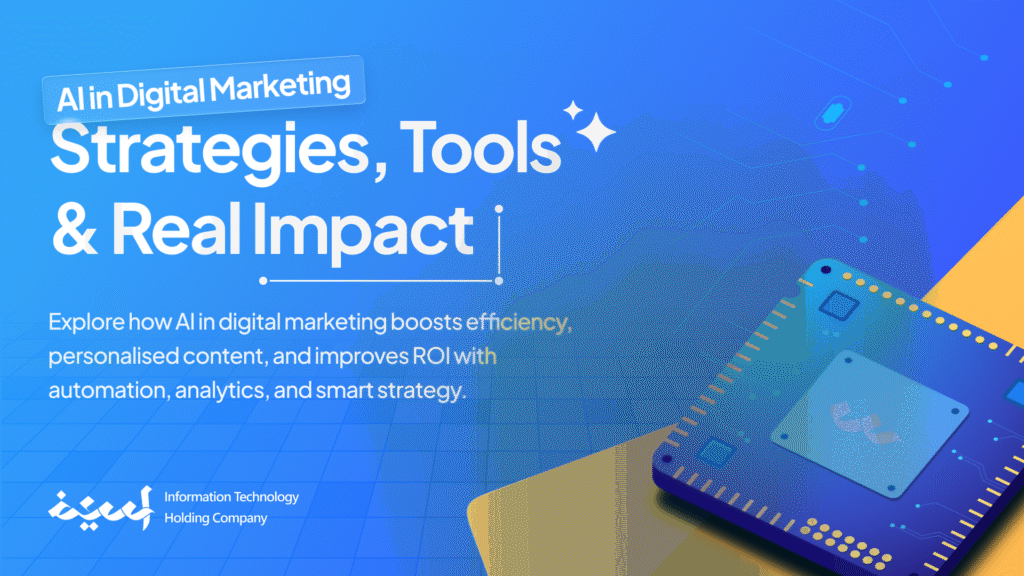
ABOUT THE AUTHOR
“Working with Aseef IT Holding Company was a seamless experience. Their team demonstrated exceptional professionalism and delivered innovative solutions that exceeded our expectations. We look forward to continuing our future projects.”
Asim Alshubrumi, CEO
Aseef IT Holding Co.
- ARTICLE

AI in Digital Marketing: Strategies, Tools & Real Impact
Explore how AI in digital marketing boosts efficiency, personalised content, and improves ROI with automation, analytics, and smart strategy.
Murrafa Banday
Explore how AI in digital marketing boosts efficiency, personalised content, and improves ROI with automation, analytics, and smart strategy.

Introduction
The Rise of AI in Digital Marketing
Artificial Intelligence (AI) has moved from being a trend to a key part of digital marketing strategies. From repetitive task automation to accurate customer behavior prediction, the role of AI in digital marketing is essentially revolutionizing the way brands engage with their consumers.
At Aseef, we’ve collaborated with startups and small-to-medium-sized businesses to apply AI driven tools such as chatbots, intelligent content creation, or predictive campaign optimisation.We’ve found that even modest AI initiatives can really enhance engagement, improve return on investment, and raise the overall customer experience.
Testimonials From Satisfied Clients
Clients consistently praise Aseef IT Holding Company’s work. Here are a few highlights from website redesign project:
Working with Aseef IT Holding Company was a seamless experience. Their team demonstrated exceptional professionalism and delivered innovative solutions that exceeded our expectations. We look forward to continuing our future projects.
David Reynolds, Chief Technology Officer, Nexora Solutions

Understanding AI in Digital Marketing
Artificial Intelligence (AI) in digital marketing employs technologies such as machine learning, natural language processing (NLP), and data analytics to automate, personalize, and optimize. The use of AI in digital marketing enables marketers to make quicker, data-driven decisions and forecast customer behavior with higher accuracy.
Rather than trusting human processes, AI technologies scan real-time data to segment audiences, personalize messaging, and even automate conversations using chatbots. For instance, predictive models can detect high intent users, while content generation tools generate personalized emails or advertisements at scale.

Effective Ways to Use AI in Digital Marketing
Applications of AI in digital marketing span nearly every stage of the marketing funnel—from attracting the right audience to converting leads and retaining customers. When used strategically, it enhances both efficiency and personalization.
Customer Segmentation:
Tools like Salesforce Einstein or Adobe Sensei analyze behavior and demographics to group audiences more accurately than manual sorting.
Personalized Content Creation:
AI writing tools such as Copy.ai or Jasper generate tailored ad copy, product descriptions, or emails in seconds, adjusting tone and format for different segments.
According to data shared by Neil Patel at DES2024, 71% of consumers expect marketing campaigns to be personalized, and 89% of marketers report a positive ROI when campaigns are tailored to their target audience. Additionally, personalization has been shown to bring in up to 40% more revenue, which is why more and more companies are leveraging AI to individualize customer experiences across channels.
DES2024: Neil Patel’s 9 tips on the use of AI in digital marketing | Startups Magazine
Predictive Analytics:
Tools that predict customer behavior, such as who is likely to convert or unsubscribe, help clients take better action.
Chatbots & Virtual Assistants:
AI-driven bots on websites and social platforms respond instantly to customer queries, reducing response time and improving user satisfaction.
Ad Optimization:
Platforms like Google Performance Max and Meta Advantage+ automatically adjust bids and creatives for better ROI.

Strategic Planning for AI in Digital Marketing
Building a successful AI marketing strategy takes more than adopting new tools, it’s about aligning technology with your brand objectives, audience requirements, and state of operational readiness.
Establish Clear Business Objectives
Start by setting clear business goals. Think about what you want AI to help with—getting more leads, talking to customers, personalizing content, or improving campaigns. Connect these goals to specific results you can measure.
Audit Your Current Marketing Stack
Evaluate what tools and data sources you currently use (e.g., CRM, email solutions, ad platforms). Identify areas where AI will deliver the most value like real time personalization or ad automation.This step is essential in understanding how AI is used in digital marketing effectively.
Select the Appropriate AI Tools
Choose tools depending on your objectives and team skillset. For instance
Small businesses could employ Jasper for content or ChatGPT for automation.
Enterprises could go for embedded AI like Salesforce Einstein or Adobe Sensei.
Hire platforms such as Accenture or Salesforce for AI readiness checklists and case studies.
Train Your Team
Upskill internal teams with foundational AI literacy—AI output interpretation, effective prompting, and tool performance evaluation.
Begin with a Pilot Project
Don’t try to rebuild everything at once. Start with a single use case such as automating email personalization or predictive lead scoring. Evaluate results, improve, and scale incrementally.
Monitor, Optimize & Stay Ethical
Use feedback loops to test what’s working. Check performance regularly, tweak campaigns, and make sure your application of AI complies with privacy regulations (e.g., GDPR, CCPA). Transparency builds long-term trust.
Pro Tip: AI should support – not -replace human marketers. Leave human creativity and judgment at the core of your strategy.
According to Salesforce “AI is sometimes incorrectly framed as machines replacing humans. It’s not about machines replacing humans, but machines augmenting humans.”35 AI Quotes to Inspire You | Salesforce India
10 Min Read:
Website Design Audit: A comprehensive Audit Guide
Most Popular Skills Used in AI-Powered Digital Marketing
With AI taking the spotlight in today’s marketing, professionals require technical as well as strategic expertise to remain competitive. We’ve trained teams and hired talent for AI-powered projects, and certain skill sets consistently stand out.These are critical as the applications of AI in digital marketing continue to expand.
Top In-Demand Skills:
Data Analysis & Interpretation:
Marketers should feel at ease reading dashboards, interpreting performance metrics, and making business decisions based on AI-driven insights.
Prompt Engineering:
Having the skills to craft accurate, context-aware prompts using tools such as ChatGPT or Jasper is essential to produce quality content.
AI Tool Proficiency:
Knowledge of working with tools such as Google Performance Max, Salesforce Einstein, or Adobe Sensei is highly valued.
AI SEO & Content Optimization:
Having expertise in utilizing AI tools to optimize content for search (e.g., SurferSEO, Clearscope) is fast becoming an essential requirement.
Audience Segmentation & Personalization:
The ability to analyze customer data to craft micro-targeted campaigns is essential.
Ethical & Responsible AI Use:
Understanding data privacy regulations and avoiding algorithmic bias builds long-term brand trust.
The Real Impact of AI in Digital Marketing: Pros and Cons
PROS:
Efficiency & Speed:
AI can automate tasks like content generation, lead scoring, and ad targeting—saving hours of manual work.
Improved Personalization:
Predictive analytics and behavioral monitoring tools enable more precise content and timing for every user, resulting in greater engagement and ROI.
Smarter Decisions:
AI processes huge data sets to discover patterns that human teams might miss, resulting in more intelligent strategies.
According to digital marketing agency ,60% of organizations say they will increase AI tool spending in 2025, signaling widespread confidence in AI to boost marketing performance and ROI https://digitalagencynetwork.com/
CONS:
Lack of Human Touch:
The AI written content can feel too generic or off brand, particularly when it lacks human control.
Data Dependency:
Inadequate or low quality data may result in poor predictions or inaccurate results.
Over-Reliance Risk:
We’ve seen businesses delay key decisions by waiting for AI validation instead of using human judgment when needed.
While AI can transform marketing, it needs careful implementation. Companies need to keep experimenting, adapting, and refining their strategy to align with particular purposes and audience demands.

Correspondence Management System
AWJ Murasalah is a system for managing official correspondence, memos, and document workflows efficiently.
Working with Aseef IT Holding Company was a seamless experience. Their team demonstrated exceptional professionalism and delivered innovative solutions that exceeded our expectations. We look forward to continuing our collaboration in future projects.
David Reynolds, Chief Technology Officer, Nexora Solutions
Conclusion
AI is transforming digital marketing with real world impact—from smarter targeting to accelerated content generation. Its value, however, lies in employing it strategically, not just because it’s trendy.
With increasing adoption of AI, being knowledgeable and ethical is crucial. Marketers need to balance creativity with accountability, with transparency and trust being at the center of every campaign.
Blog Summary
Artificial Intelligence (AI) has moved from being a trend to a key part of digital marketing strategies. From repetitive task automation to accurate customer behavior prediction, the role of AI in digital marketing is essentially revolutionizing the way brands engage with their consumers.
Artificial Intelligence (AI) in digital marketing employs technologies such as machine learning, natural language processing (NLP), and data analytics to automate, personalize, and optimize.
Applications of AI in digital marketing span nearly every stage of the marketing funnel—from attracting the right audience to converting leads and retaining customers. When used strategically, it enhances both efficiency and personalization.
Building a successful AI marketing strategy takes more than adopting new tools, it's about aligning technology with your brand objectives, audience requirements, and state of operational readiness.
With AI taking the spotlight in today's marketing, professionals require technical as well as strategic expertise to remain competitive. We've trained teams and hired talent for AI-powered projects, and certain skill sets consistently stand out.These are critical as the applications of AI in digital marketing continue to expand.
While AI can transform marketing, it needs careful implementation. Companies need to keep experimenting, adapting, and refining their strategy to align with particular purposes and audience demands.
Frequently Asked Questions (FAQs)
Explore Our Proven Success in IT Solutions and Digital Transformation
1. Why is AI in digital marketing important?
AI technologies like machine learning and NLP are transforming digital marketing by automating tasks, personalizing campaigns, and improving decision-making. This enables brands to deliver better customer experiences, increase efficiency, and boost ROI with fewer manual resources.
2. Is AI only suitable for large marketing teams or agencies?
No. AI tools are now accessible to small and mid-sized businesses. Platforms like ChatGPT, Jasper, and Canva AI are user-friendly, affordable, and scalable based on your team’s size and technical skills.
3. What are the most effective ways to use AI in digital marketing today?
AI can power personalized content, predictive analytics, dynamic ads, chatbots, and customer segmentation. Tools like Google Performance Max or Salesforce Einstein can optimize campaigns in real time and improve conversions.
4. How do I know if my business is ready to implement AI marketing tools?
Start by auditing your current marketing stack. If you have structured data, active campaigns, and defined goals, you’re likely ready. A pilot project (like automating email personalization) is a great way to start.
5. How can Aseef help us implement AI in digital marketing without disrupting our existing setup?
Aseef begins with goal alignment and small-scale pilots. We integrate AI tools with your current platforms (CRM, CMS, ad channels), provide team training, and ensure ethical, secure use—without interrupting ongoing campaigns.
- Publication Date
Category
- Artificial Intelligence
Table of Contents
Ready to Transform?
Whether you’re starting your digital journey or scaling transformation, Aseef is your reliable IT consulting company in Saudi Arabia.

